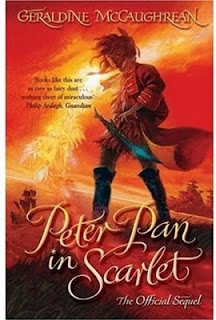Peter Pan in Scarlet by Geraldine McCaughrean
James Matthew Barrie wrote Peter Pan in the start of the 20th century and it became a best-seller. In 1929 he gave the Great Ormond Street Hospital for sick children all rights to Peter Pan, meaning that all income it would bring from then on went to them. In time it has become a far greater gift that Barrie could ever have imagined.
In 2004 the Hospital for the first time ever decided to have a sequel written and a competition was held - Geraldine McCaughrean won and Peter Pan in Scarlet was the result.
----------
Something is wrong in Neverland. Strange dreams are leaking out and into the ordinary world and Wendy and the Lost Boys, now all grown-up, can only find one reason - Peter Pan needs their help.
When they return to Neverland it's a changed place; it's no longer the fantastic summer-island, it was in their childhood. Time (!), bitterness and sorrow has taken it's toll on the place and it's a scary world out there. Neverland was never safe, but now it's truly out to get you.
What's wrong with Peter Pan and who's the travelling man, Ravello?
----------
The problem with authors writing a story based on another's work is the risk of it either seeming like fan-fiction or just a poor imitation. Instead of making the story truly hers, McCaughrean tries to duplicate Barrie's way of writing and it just doesn't quite work. Sometimes she's close, but often it just feels off.
Neverland is a very complicated place and I think that Barrie's imaginative madness there is just not possible to duplicate. Pan returns as his complicated self, but he's slightly off. Wendy is the one character which McCaughrean nails completely, and the lost boys all grown up are also acceptable. I thought it was very clever the way they find their way back to Neverland and I did enjoy the various sub-plots.
I thought the main plot was fairly original and well thought through, but at the same time it was just also too simple and easy. Peter Pan in Scarlet is by no means a great literary work, but as a fund-raiser it serves its purpose and I think a younger audience (for whom it was intended and won't over-think it) would enjoy it.
Myself, I'd prefer reading something completely by McCaughrean and see what she can do on her own.
228 pages / published in 2006
Review by Iben Jakobsen, BoB, 2011
Review by Iben Jakobsen, BoB, 2011

Kommentarer
Send en kommentar